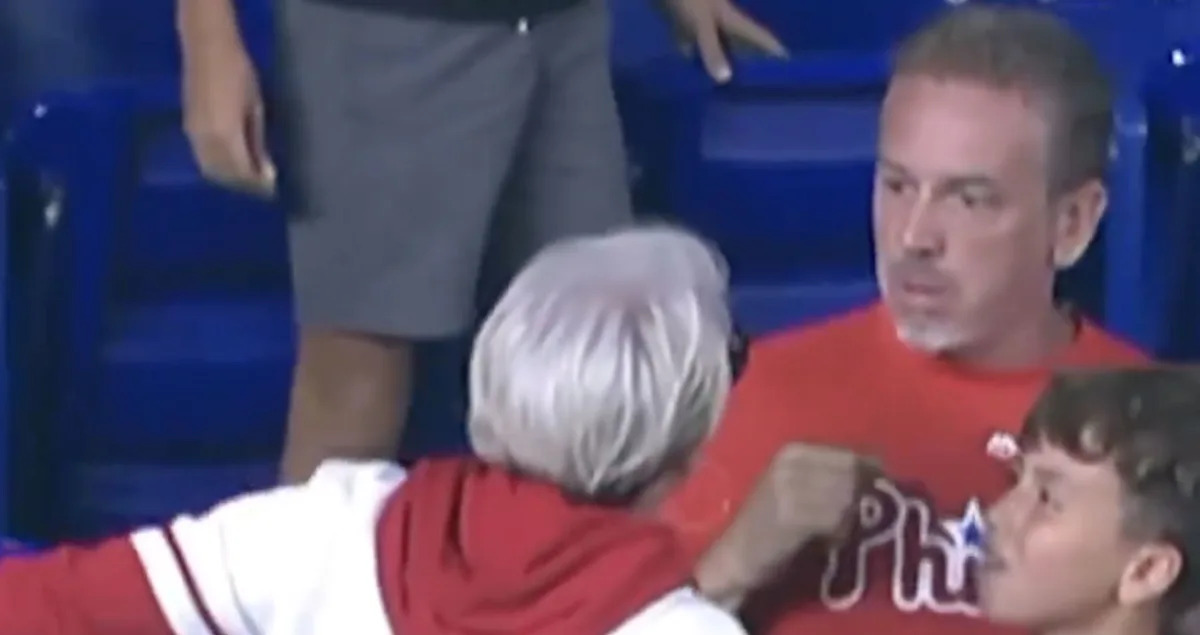On a seemingly ordinary evening at a Philadelphia Phillies game against the Miami Marlins, an unexpected and controversial incident unfolded that quickly captured the internet’s attention. The incident involved Drew Feltwell, a father attending the game with his family, and a woman who has since been dubbed the “Phillies Karen” for her confrontational behavior.
### The Incident: A Father’s Delight Turned Sour
Drew Feltwell, a die-hard Phillies fan from New Jersey currently living in West Palm Beach, Florida, experienced the thrill of catching a home run ball hit by center fielder Harrison Bader during the game. The excitement was palpable as Feltwell caught the ball and handed it to his young son, Lincoln. For many fans, catching a home run ball represents a cherished moment, particularly when shared with family.
However, all was not as it seemed. Just as Feltwell embraced his son, the woman in a Phillies jersey stormed over, loudly claiming possession of the ball. In a moment captured on video that quickly went viral, she confronts him, asserting, “That’s my ball,” displaying a level of aggression that caught both Feltwell and the surrounding crowd off guard.
Feeling pressured and sensing the escalating tension, Feltwell ultimately decided to give the ball to the woman to deescalate the situation. “I had a fork in the road: either do something I was probably going to regret or be dad and show him how to deescalate the situation,” he later told NBC Philadelphia. Though he acknowledged his disappointment, he felt it was important to model conflict resolution for his son.
### Consequences and Reactions
Following the incident, a wave of reactions emerged from social media, with many people expressing outrage towards the woman’s behavior. Videos of her confrontation painted a picture of entitlement that resonated negatively with the online community. Notably, the situation escalated when the woman was seen confronting a man who heckled her from the stands after the altercation, culminating in her being booed by other fans, showcasing a near-universal disapproval of her actions.
Interestingly, the term “Phillies Karen” became a trending descriptor, leading to an online search for the woman’s identity. However, an essential aspect of social media dynamics emerged as online sleuths erroneously identified various individuals, including a woman named Cheryl Richardson-Wagner, who clarified on Facebook that she was not involved in the incident and humorously noted her allegiance to the Boston Red Sox.
### Community Response and Support for Lincoln
In a heartening turn of events amid the drama, a representative from the Marlins gifted young Lincoln a goodie bag post-game as a consolation gesture. Moreover, in an act of sportsmanship and kindness, Harrison Bader personally met with the Feltwell family to present Lincoln with a signed bat. This act served as a reminder of the overarching values of sportsmanship and community, shining a positive light on an otherwise contentious situation.
The tension from the fight for the ball underscores a broader discussion regarding entitlement, behavior in public spaces, and how adults handle conflicts, especially in front of children. Feltwell’s choice to prioritize his son’s experience over reacting aggressively is commendable and serves as an important lesson.
### Ethics in Sports and Parents’ Responsibilities
This incident isn’t isolated. Just days prior, a similar encounter occurred at the U.S. Open, where a man was filmed unjustly taking a hat intended for a child. Moments like these raise ethical questions about the conduct of adults in public arenas, particularly when children are involved. As spectators, we must continually reflect on our personal behavior in the pursuit of hobbies that bring joy, ensuring that we set a positive example for younger generations.
Furthermore, discussions among parents and the broader community regarding comfort levels in public spaces highlight the importance of teaching children how to handle disappointment gracefully. Drew Feltwell’s handling of the situation may have inadvertently imparted a valuable lesson to Lincoln about confronting conflict maturely and the significance of empathy in difficult circumstances.
### The Quest to Identify ‘Phillies Karen’
Even as the search for the “Phillies Karen” continues, with various rumors and claims swirling, Drew Feltwell expressed that he does not expect an apology from her, nor does he desire the ball back at this point. He emphasizes that the experience should stand as a cautionary tale about respect, behavior, and accountability in shared spaces.
Moreover, in a statement reflecting community solidarity, the Hammonton Public Schools issued a declaration distancing themselves from any associations with the incident, assuring that the woman is not affiliated with their institution—a summation that far too many identities have been incorrectly linked to social media headlines.
### Conclusion
The viral tale of the “Phillies Karen” is emblematic of a deeper conversation about civility in sports, public interaction, and the shared experience of fandom. While the immediate narrative focuses on a single, disruptive incident, the broader themes of community, respect, and appropriate behavior remind us of our shared responsibility as spectators and participants.
Ultimately, through handling this incident with poise, Drew Feltwell has set a precedent on how to navigate life’s unexpected challenges—and in doing so, he has inadvertently become a mentor in conflict resolution for both his son and the countless viewers who have followed the story. As the quest for identity continues, the lessons learned from this saga will likely resonate far beyond the left field stands of a baseball game.
Source link










